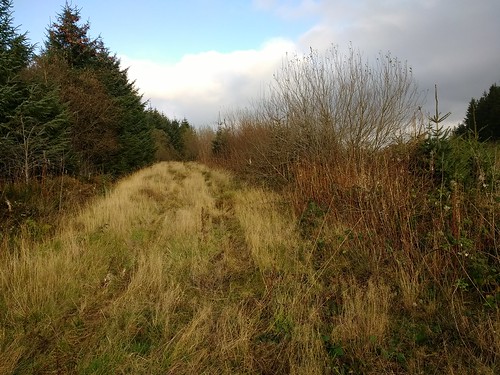The woodland is accessed through a single gate which has recently been replaced.

Ty Gwyn 2022: The entrance gate and adjacent fencing has been recently renewed
The site includes a shallow valley which runs from the south-west to the north-east. The southern part of the site is served by the 'southern' road leading south-west from the gate, with a parallel 'northern' road accessing the northern sections. The two main roads are linked by a short road across the valley, resulting in a layout like an 'H' on its side. All the roads are of rolled, crushed stone (quarried from just outside the woodland boundary boundary by agreement) and are intended to be suitable for the large lorries employed in removing logs during felling.
But the productive phase of forestry is a once-in-a-generation event. Since I became involved in the already-mature woodland at Ty Gwyn in 1988, I have seen two major felling operations, resulting in most of the site area having been re-planted once. The proceeds of that felling then have to pay not only for re-planting but for maintenance for many years until it is economical to carry out further felling. What determines when felling is worthwyile depends upon many factors - not only tree growth rates, attrition from disease and pests, adverse weather events (particularly fire and windblow) but also on global economic conditions. Because Ty Gwyn was already mature in 1988, an early investment was made in installing the road system described above, in anticipation of early timber sales. But in 1991 the Soviet Union collapsed, bequeathing to a nummber of newly-independent countries well-managed Soviet forests. Seeking foreign exchange, the aggressive selling of this timber by these countries delayed felling at Ty Gwyn for a number of years. Further complications have arisen from the United Kingdom's devolution of powers to Wales (Government of Wales Act 1998, Government of Wales Act 2006 and The Wales Act 2014) with ever-changing legislation.
After the harvesting described in various earlier posts, re-stocking involved manually planting nursery-grown Sitka seedlings. But this intentional planting is augmented by self-regeneration as already-established trees on site go through their cycle of growth. This means that young trees of different ages can be seen everywhere growing conditions are favourable, which is often the roads themselves. Periodic flailing is necessary to keep the roads open to ordinary vehicles. Being unsure of the state of the forest roads, we decided to park at the gate and conduct our inspection on foot. The picture below shows a healthy-looking self-set Sitka at the roadside near the fascinating horizontal webs we found around the site

Ty Gwyn 2022: Sitka self-regeneration and horizontal disc-like webs on the heather, highlighted by water droplets
The view below shows the satisfactory growth of the 2010 planting on the left. The taller trees in the left background are the unfelled remains of the 1995 planting. The later 2016 planting is on the right and not really visible here because of the inclined ground.

Ty Gwyn 2022: Looking south-west on the southern road from just inside the access gate, with the 2010 re-stocking on the left Although growth rates are good, it will be many years before these trees are as mature as those shown below, which shows the previous trees to occupy this area in 2006, prior to felling, again looking south-west along the southern road but from a position outside the access gate.

Ty Gwyn 2006: Looking south-west on the southern road, before harvesting of timber
We took the link road across the valley to get a better view of the 2016 planting which lies on both sides of the link road, filling the valley floor. Because of satisfactory growth rates, a programme of 'respacing' is currently being implemented where weaker trees are removed to improve the growth of the remaining trees. This is discussed further in a Forestry Commission publication linked in 'References' below.

Ty Gwyn 2022: View looking east from the link road, giving a better idea of the progress of the 2015 planting. Note the wind turbines in the distance
We first inspected the eastern end of the northern road, leading to the Pool.

Ty Gwyn 2022: View fronm the eastern end of the northern road, looking down the track leading to the Pool
On the western arm of the northern road, we found two types of fungus. The first seemed to be a mature puffball, wuth the dark central pore open to allow wind and rain to disperse the spores - possibly Apioperdon. The second had a traditional 'toadstool' shape with a red cap - perhaps Fly Agaric or a Russula? We were not tempted to snack.

Ty Gwyn 2022: At various locations along the northern road, we found this interesting fungus

Ty Gwyn 2022: At various locations there were examples of this fungus
Returning to the link road, I took this shot looking east.

Ty Gwyn 2022: View looking east along the northern road, with the 1995 protective strip on the left and the 2016 planting at lower level on the right, together with various broadleaves
Finally, we inspected the west end of the south road. Dean went to the end of the road but I stopped a little short, as I was tiring.

Ty Gwyn 2022: Looking west along the south road with the 2016 planting on the right.
Walking back to the car, Dean suggested collecting one of the 'respaced' trees which had been cut down by chainsaw to allow adjacent trees to thrive so, for the very first time, Brewood Hall has had a (modest) Christmas Tree actually grown at Ty Gwyn! Reference
Respacing naturally regenerating Sitka spruce and other conifers
(Forestry Commission)
My posts about Ty Gwyn
You can find all my posts about Ty Gwyn here (in reverse date-of-posting order), with links to albums of pictures.
Pictures of Ty Gwyn
Pictures from this visit are at Ty Gwyn 2022
You can find all my albums of pictures of Ty Gwyn here.

